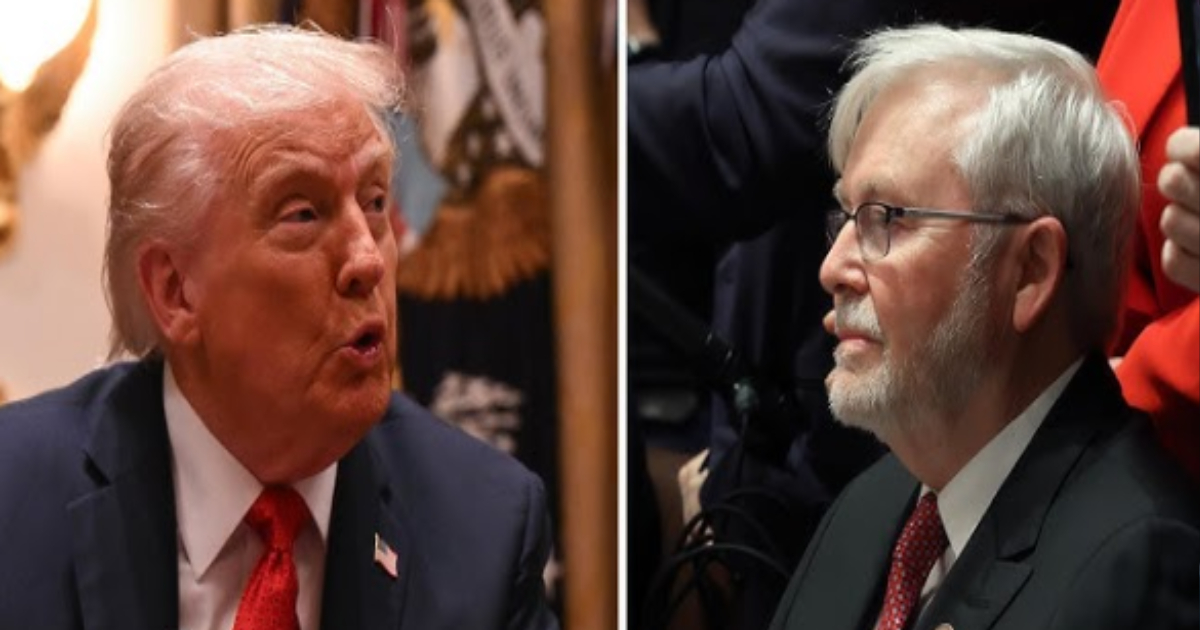It was meant to be a formal meeting about trade and security, but President Donald Trump’s sit-down with Australian Prime Minister Anthony Albanese briefly turned into an awkward diplomatic comedy when Trump realized he was seated across from a man who once called him a “village idiot.”
The meeting, held in the White House Cabinet Room, centered on strengthening U.S.-Australia relations amid growing concerns over China’s control of the global minerals market. But the serious tone shifted when an Australian journalist asked Trump whether he had concerns about Australia’s stance on Palestine, climate change, or comments once made by its ambassador to the U.S., Dr. Kevin Rudd.
Trump, visibly caught off guard in the clip, turned to Albanese and asked, “Where is he, is he still working for you?” Albanese, smiling, gestured across the table. “Right there,” he replied, pointing to Rudd.
Spotting Rudd, Trump leaned forward with his trademark grin and quipped, “You said bad?” Rudd, the former Australian prime minister and now ambassador, smiled back and replied, “Before I took this position, Mr. President.” Without missing a beat, Trump fired back, “I don’t like you either. And I probably never will.”
The exchange, equal parts tense and playful, drew laughter from the room. Reporters captured the moment, which quickly made its way across social media in both countries. Political observers were quick to note that Rudd had indeed once referred to Trump as a “village idiot” during his years as an outspoken critic of the then-U.S. president’s foreign policy.
While the viral moment grabbed headlines, the meeting’s main purpose was far more consequential. Both leaders spent the bulk of the session discussing how to reinforce cooperation on essential minerals, resources critical for renewable energy technology and defense equipment.
Australia’s vast mineral reserves are key to global production of batteries, solar panels, and wind turbines. The country extracts nearly half of the world’s lithium and roughly a quarter of its bauxite, along with sizable reserves of cobalt, manganese, and rare earth elements.
Those minerals have become a flashpoint in the competition with China. Beijing controls much of the global rare earth supply chain and recently announced new restrictions on exports of rare earth materials. The policy, labeled “Announcement No. 62 of 2025,” requires foreign companies to obtain special approvals to export products containing even trace amounts of rare earths and to declare their intended use.
In response, Trump warned that the United States may impose a 100% tariff on Chinese goods and tighten export controls on key technologies. “This is China versus the world,” said U.S. Treasury Secretary Scott Bessent, who attended the meeting. “They have pointed a bazooka at the supply chains and the industrial base of the entire free world, and we’re not going to have it.”
Albanese echoed that sentiment, emphasizing that “Australia will stand with its allies to ensure fair and open access to critical resources.”
Still, for many observers, the mineral strategy may have taken a backseat to Trump’s exchange with Rudd, a sharp reminder that old grudges can resurface in even the most formal settings. As one Australian reporter put it afterward, “It was a moment that perfectly captured Trump’s blend of humor and hostility. Only he could turn a minerals summit into a diplomatic sitcom.”









